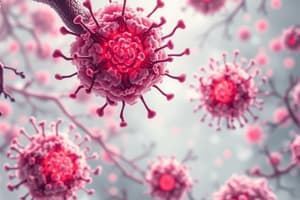Podcast
Questions and Answers
What characterizes Type IV hypersensitivity reactions?
What characterizes Type IV hypersensitivity reactions?
- Triggered by the presence of antibodies
- Involves T cell activation (correct)
- Immediate response to allergens
- Causes anaphylaxis
What role does the Major Histocompatibility Complex (MHC) play in the immune system?
What role does the Major Histocompatibility Complex (MHC) play in the immune system?
- Regulating the synthesis of platelets
- Identifying self from non-self antigens (correct)
- Producing antibodies against viruses
- Mutating pathogens for immune response
Which type of MHC is expressed on all somatic cells and interacts only with T cytotoxic cells?
Which type of MHC is expressed on all somatic cells and interacts only with T cytotoxic cells?
- Class I MHC (correct)
- Class IV MHC
- Class III MHC
- Class II MHC
What does the breakdown in tolerance in autoimmune diseases signify?
What does the breakdown in tolerance in autoimmune diseases signify?
Which of the following statements about cross-reactivity in autoimmune disease mechanisms is true?
Which of the following statements about cross-reactivity in autoimmune disease mechanisms is true?
What is a common example of a drug that can induce an autoimmune response?
What is a common example of a drug that can induce an autoimmune response?
What is the primary purpose of Class II MHC in the immune system?
What is the primary purpose of Class II MHC in the immune system?
What is the importance of the extreme polymorphism observed in the Major Histocompatibility Complex?
What is the importance of the extreme polymorphism observed in the Major Histocompatibility Complex?
Which pattern of staining is characterized as more typical for systemic lupus erythematosus (SLE)?
Which pattern of staining is characterized as more typical for systemic lupus erythematosus (SLE)?
What is the primary mechanism involved in hyperacute transplant rejection?
What is the primary mechanism involved in hyperacute transplant rejection?
Which of the following diseases is associated with antibodies binding to nicotinic acetylcholine receptors on muscle cells?
Which of the following diseases is associated with antibodies binding to nicotinic acetylcholine receptors on muscle cells?
What type of transplant rejection occurs within two weeks after transplantation?
What type of transplant rejection occurs within two weeks after transplantation?
In the context of alloimmunity, which condition is characterized by an antibody-mediated destruction of fetal platelets?
In the context of alloimmunity, which condition is characterized by an antibody-mediated destruction of fetal platelets?
Which type of immunodeficiency is characterized by a deficiency in T cells?
Which type of immunodeficiency is characterized by a deficiency in T cells?
What is the result of chronic transplant rejection?
What is the result of chronic transplant rejection?
Which of the following is NOT a type of primary immunodeficiency disease?
Which of the following is NOT a type of primary immunodeficiency disease?
What type of hypersensitivity is characterized as immediate and IgE mediated?
What type of hypersensitivity is characterized as immediate and IgE mediated?
Which of the following is a key feature of Type II Hypersensitivity reactions?
Which of the following is a key feature of Type II Hypersensitivity reactions?
What is a common example of Type III Hypersensitivity?
What is a common example of Type III Hypersensitivity?
Which genetic factor is commonly overrepresented in patients with Systemic Lupus Erythematosus (SLE)?
Which genetic factor is commonly overrepresented in patients with Systemic Lupus Erythematosus (SLE)?
Which hypersensitivity reaction is primarily mediated by T-cells?
Which hypersensitivity reaction is primarily mediated by T-cells?
What is a characteristic of X-Linked Hypogammaglobulinemia, also known as Bruton’s Disease?
What is a characteristic of X-Linked Hypogammaglobulinemia, also known as Bruton’s Disease?
What is a characteristic of autoimmune thyroiditis regarding T cell specificity?
What is a characteristic of autoimmune thyroiditis regarding T cell specificity?
What kind of immune response is primarily involved in Myasthenia Gravis?
What kind of immune response is primarily involved in Myasthenia Gravis?
What occurs during mast cell degranulation in Type I Hypersensitivity?
What occurs during mast cell degranulation in Type I Hypersensitivity?
What causes the deficiency in T cell maturation in DiGeorge's Syndrome?
What causes the deficiency in T cell maturation in DiGeorge's Syndrome?
Which condition is most commonly associated with a lack of serum and secretory IgA?
Which condition is most commonly associated with a lack of serum and secretory IgA?
Which of the following best describes the Arthus reaction?
Which of the following best describes the Arthus reaction?
Which autoimmune condition is associated with the HLA-B27 antigen?
Which autoimmune condition is associated with the HLA-B27 antigen?
Which statement about Type III Hypersensitivity is true?
Which statement about Type III Hypersensitivity is true?
What is the nature of damage caused by immune complex deposition in SLE?
What is the nature of damage caused by immune complex deposition in SLE?
What is a common outcome of Transient Hypogammaglobulinemia in children?
What is a common outcome of Transient Hypogammaglobulinemia in children?
What is a common manifestation of Type II Hypersensitivity?
What is a common manifestation of Type II Hypersensitivity?
Which of the following is associated with Chronic Mucocutaneous Candidiasis?
Which of the following is associated with Chronic Mucocutaneous Candidiasis?
Which hormone receptor is a target in cases of hyperthyroidism?
Which hormone receptor is a target in cases of hyperthyroidism?
What is one of the secondary causes for T cell deficiencies mentioned?
What is one of the secondary causes for T cell deficiencies mentioned?
Which human protein has structural homology to the pathogen responsible for Rheumatoid arthritis?
Which human protein has structural homology to the pathogen responsible for Rheumatoid arthritis?
What component of immune dysregulation is indicated by the presence of spontaneously activated T & B cells?
What component of immune dysregulation is indicated by the presence of spontaneously activated T & B cells?
Which immunodeficiency is characterized by an increased loss of immunoglobulins?
Which immunodeficiency is characterized by an increased loss of immunoglobulins?
Which disease is characterized by antibodies against nucleic acids, RBCs, WBCs, and coagulation proteins?
Which disease is characterized by antibodies against nucleic acids, RBCs, WBCs, and coagulation proteins?
What type of antibodies are produced defectively in Multiple myeloma?
What type of antibodies are produced defectively in Multiple myeloma?
Which autoimmune disease involves the breakdown of the insulin receptor leading to resistance?
Which autoimmune disease involves the breakdown of the insulin receptor leading to resistance?
Flashcards are hidden until you start studying
Study Notes
Allergy & Hypersensitivity
- Immune responses can be triggered by environmental agents, foods, or drugs not inherently harmful.
Type I Hypersensitivity
- Immediate allergic responses classified as IgE mediated, leading to release of histamine, leukotrienes, and prostaglandins from mast cells and basophils.
- Characterized by familial associations; examples include acute anaphylaxis, hay fever, and food allergies.
Type II Hypersensitivity
- Cytotoxic reactions mediated by IgG or IgM and involve complement, affecting cells contacting circulating plasma.
- Results in opsonization, inflammation, and antibody-mediated dysfunction.
- Examples include hemolytic anemia, transfusion reactions, and Graves’ disease.
Type III Hypersensitivity
- Immune complex reactions that are also mediated by IgG or IgM and depend on complement, causing tissue damage through immune complex formation.
- Notable examples: serum sickness from horse or bovine serum, and the Arthus reaction—a dermal inflammatory response.
Type IV Hypersensitivity
- Delayed or cell-mediated reactions primarily involving T-cells sensitized to local antigens, mediated by lymphokines and direct cellular toxicity.
- Contact sensitivity reactions, such as those caused by poison ivy, exemplify this type.
Autoimmunity
- Occurs when the immune system mistakenly recognizes self-antigens as foreign, leading to diseases like Crohn’s disease.
Major Histocompatibility Complex (MHC)
- Found on chromosome 6 in humans, MHC is crucial for immune function, distinguishing self from non-self.
- Class I MHC interacts with T cytotoxic cells, while Class II MHC interacts with T helper cells. Class III MHC is involved in complement activation.
Autoimmune Disease Mechanisms
- Pathogenesis may be triggered by drug-induced or virus-induced cell surface changes, genetic predispositions (like HLA-DR2 in systemic lupus erythematosus), and abnormal immune regulation.
- Dysregulation can stem from B cell overactivity or the presence of spontaneously activated immune cells.
Types of Autoimmune Diseases
- MHC Class II-associated diseases may be organ-specific or systemic. Systemic lupus erythematosus is representative of systemic diseases.
- MHC Class I-linked diseases include ankylosing spondylitis and psoriasis.
T Cell Mediated Autoimmune Diseases
- Examples include multiple sclerosis (specific to myelin) and insulin-dependent diabetes mellitus (involves pancreatic islet cells).
Systemic Lupus Erythematosus (SLE)
- Characterized by the production of autoantibodies against nucleic acids, red blood cells, and phospholipids, causing tissue damage from immune complex deposition.
- Diagnosed through specific patterns in anti-nuclear antigen tests.
Alloimmunity
- Immune response against the antigens of other individuals of the same species, potentially leading to neonatal diseases (e.g., Graves’ disease).
- Transplant rejection can occur in various phases: hyperacute, accelerated, acute, and chronic.
Immunodeficiency Diseases
- Classified as primary (hereditary) or secondary (acquired). Over 50 known primary immunodeficiency diseases exist.
- Deficiency types include B cell, T cell, complement, and phagocytosis deficiencies.
B Cell Deficiencies
- Primary deficiencies include transient hypogammaglobulinemia, X-linked hypogammaglobulinemia (Bruton’s disease), and selective IgA deficiency (most common).
- Secondary deficiencies may arise from lymphomas or nephrotic syndrome.
T Cell Deficiencies
- DiGeorge Syndrome involves a deletion on chromosome 22, affecting thymus development and T cell maturation.
- Chronic mucocutaneous candidiasis leads to persistent Candida infections and impaired cytokine production.
Combined Immunodeficiencies
- Primary combined deficiencies affect approximately 1 in 58,000 newborns, and can involve both antibody and cellular immune responses.
Studying That Suits You
Use AI to generate personalized quizzes and flashcards to suit your learning preferences.




